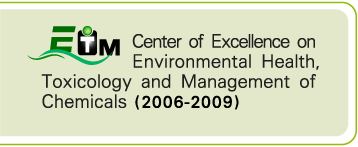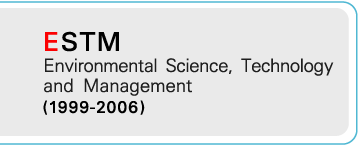Curriculum
 M.Sc. Program (Environmental Science)
M.Sc. Program (Environmental Science)
| M.Sc. Program | |
|---|---|
| Minimum total credit hours | 36 credits |
| Core Courses | 14 credits |
| Elective Courses | 10 credits |
| Thesis | 12 credits |
| Core Courses (14 Credits) | |
|---|---|
| 301511 | Experimental Design and Statistical Analysis (3) |
| 309537 | Environmental Toxicology (3) |
| 313521 | Environmental Impact Assessment (3) |
| 313551 | Environmental Pollution Control and Prevention (3) |
| 313691 | Seminar I (1) |
| 313692 | Seminar II (1) |
| Elective Courses (10 Credits) | |
| 309535 | Fish Immunotoxicology (3) |
| 309553 | Geographical Information Systems for Aquatic Resources Management (3) |
| 309554 | Remote Sensing for Aquatic Resources Management (3) |
| 313522 | Health Impact Assessment (3) |
| 313531 | Environmental Chemistry (3) |
| 313532 | Genetics and the Environment (3) |
| 313533 | Aquatic Pollution and Global Environmental Crisis (3) |
| 313534 | Microbiology of Environment (3) |
| 313535 | Environmental Physiology (3) |
| 313536 | Environmental Genetics (3) |
| 313537 | Stable Isotope in Ecology and Environmental Science (3) |
| 313538 | Environmental Ecology (3) |
| 313541 | Toxicology and Food Safety (3) |
| 313542 | Environmental Biomarkers (3) |
| 313552 | Noise pollution and Vibration Control (3) |
| 313553 | Air Pollution Control (3) |
| 313554 | Environmental Quality Monitoring (3) |
| 313555 | Environmental Molecular Biotechnology (3) |
| 313556 | Environmental Remote Sensing (3) |
| 313571 | Wastewater Treatment (3) |
| 313572 | Hazardous Waste Management (3) |
| 313573 | Biodegradation and Bioremediation (3) |
| 313581 | Environmental Economics (3) |
| 313582 | Environmental management (3) |
| 313583 | Environmental Law (3) |
| 313584 | Environmental Management System, ISO14000 (3) |
| 313585 | Water Resources Management (3) |
| 313611 | Scientific English Writing for Environmental Science (3) |
| 313621 | Advanced Environmental Impact Assessment (3) |
| 313631 | Human Ecology (3) |
| 313664 | Selected Topics in Environmental Science and Technology I (3) |
| 313665 | Selected Topics in Environmental Science and Technology II (3) |
| Thesis (12 Credits) | |
| 313699 | Thesis (12) |
 Ph.D. Program (Environmental Science)
Ph.D. Program (Environmental Science)
| A. For students with Bachelor’s Degree, no fewer than 84 credits (International) | |
|---|---|
| Core Courses | 20 credits |
| Elective Courses | 16 credits |
| Thesis | 48 credits |
| Required Courses (20 Credits) | |
|---|---|
| 301511 | Experimental Design and Statistical Analysis (3) |
| 309537 | Environmental Toxicology (3) |
| 313521 | Environmental Impact Assessment (3) |
| 313551 | Environmental Pollution Control and Prevention (3) |
| 313581 | Environmental Economics (3) |
| 313583 | Environmental Law (3) |
| 313691 | Seminar I (1) |
| 313692 | Seminar II (1) |
| 313693 | Seminar III (1) |
| 313694 | Seminar IV (1) |
| Elective Courses (16 Credits) | |
| 223535 | Fish Immunotoxicology (3) |
| 223553 | Geographical Information Systems for Aquatic Resources Management (3) |
| 309554 | Remote Sensing for Aquatic Resources Management (3) |
| 313522 | Health Impact Assessment (3) |
| 313531 | Aquatic Biochemistry (3) |
| 309545 | Aquatic Toxic Assessment (3) |
| 313531 | Environmental Chemistry (3) |
| 313532 | Genetics and the Environment (3) |
| 313533 | Aquatic Pollution and Global Environmental Crisis (3) |
| 313534 | Microbiology of Environment (3) |
| 313535 | Environmental Physiology (3) |
| 313536 | Environmental Genetics (3) |
| 313537 | Stable Isotope in Ecology and Environmental Science (3) |
| 313538 | Environmental Ecology (3) |
| 313541 | Toxicology and Food Safety (3) |
| 313542 | Environmental Biomarkers (3) |
| 313552 | Noise pollution and Vibration Control (3) |
| 313553 | Air Pollution Control (3) |
| 313554 | Environmental Quality Monitoring (3) |
| 313555 | Environmental Molecular Biotechnology (3) |
| 313556 | Environmental Remote Sensing (3) |
| 313571 | Wastewater Treatment (3) |
| 313571 | Wastewater Treatment (3) |
| 313572 | Hazardous Waste Management (3) |
| 313573 | Biodegradation and Bioremediation (3) |
| 313582 | Environmental management (3) |
| 313584 | Environmental Management System, ISO14000 (3) |
| 313585 | Water Resources Management (3) |
| 313611 | Scientific English Writing for Environmental Science (3) |
| 313621 | Advanced Environmental Impact Assessment (3) |
| 313631 | Human Ecology (3) |
| 313664 | Selected Topics in Environmental Science and Technology I (3) |
| 313665 | Selected Topics in Environmental Science and Technology II (3) |
| Doctoral Dissertation (48 Credits) | |
| 313999 | Doctoral Dissertation (48) |
| B. For students with Master Degrees, no fewer than 48 credits (International) | |
|---|---|
| Core Courses | 9 credits |
| Elective Courses | 3 credits |
| Thesis | 36 credits |
| Required Courses (9 Credits) | |
|---|---|
| 309537 | Environmental Toxicology (3) |
| 313581 | Environmental Economics (3) |
| 313583 | Environmental Law (3) |
| 313693 | Seminar III (1) |
| 313694 | Seminar IV (1) |
| Elective Courses (3 Credits) | |
| 301511 | Experimental Design and Statistical Analysis (3) |
| 309535 | Fish Immunotoxicology (3) |
| 309553 | Geographical Information Systems for Aquatic Resources Management (3) |
| 309554 | Remote Sensing for Aquatic Resources Management (3) |
| 313521 | Environmental Impact Assessment (3) |
| 313522 | Health Impact Assessment (3) |
| 313531 | Environmental Chemistry (3) |
| 313532 | Genetics and the Environment (3) |
| 313533 | Aquatic Pollution and Global Environmental Crisis (3) |
| 313534 | Microbiology of Environment (3) |
| 313535 | Environmental Physiology (3) |
| 313536 | Environmental Genetics (3) |
| 313537 | Stable Isotope in Ecology and Environmental Science (3) |
| 313538 | Environmental Ecology (3) |
| 313541 | Toxicology and Food Safety (3) |
| 313542 | Environmental Biomarkers (3) |
| 313551 | Environmental Pollution Control and Prevention (3) |
| 313552 | Noise pollution and Vibration Control (3) |
| 313553 | Air Pollution Control (3) |
| 313554 | Environmental Quality Monitoring (3) |
| 313555 | Environmental Molecular Biotechnology (3) |
| 313556 | Environmental Remote Sensing (3) |
| 313557 | Environmental Geographic Information Systems (3) |
| 313571 | Wastewater Treatment (3) |
| 313572 | Hazardous Waste Management (3) |
| 313573 | Biodegradation and Bioremediation (3) |
| 313582 | Environmental management (3) |
| 313584 | Environmental Management System, ISO14000 (3) |
| 313585 | Water Resources Management (3) |
| 313611 | Scientific English Writing for Environmental Science (3) |
| 313621 | Advanced Environmental Impact Assessment (3) |
| 313631 | Human Ecology (3) |
| 313664 | Selected Topics in Environmental Science and Technology I (3) |
| 313665 | Selected Topics in Environmental Science and Technology II (3) |
| Doctoral Dissertation (36 Credits) | |
| 313998 | Doctoral Dissertation (36) |
*Elective Course:
- Students must select no fewer than 3 credits from the courses listed above.
- Students may also select courses from other Thai universities or from international universities to a maximum of 6 credits
 Research Area
Research Area
- Bacterial degradation efficiency with a focus on PAHs using new approaches aiming at identifying suitable species and improving the capability of the microbes. Studies are also extended to other degradation aspects applicable to improvement used in shrimp farming practices.
- Studies on biomarkers used in tracking the behaviors of organochorines, PAHs and selected heavy metals in the environment. This will include any relevant factors affecting economically important species using biomarkers in physiological changes in the aquatic environment especially in coastal waters.
- Applications of microbes such as yeasts in water and waste water treatment from industries, agriculture and community households. The studies are in combination with other approaches such as phytoremediation using aquatic plants available in the area.
- Studies on physiological functions of aquatic organisms emphasizing economically important species from coastal waters and farming areas whereas various pollutants (PAHs and heavy metals) can be potential threats to reduced quality and quantity production
- Research on innovative techniques in treating industrial and agricultural water and waste water using natural and new products such as chitosan and its products. The project is a joint research with other institutions focusing on hazardous effects heavy metals and organics.
- Integrated studies on environmental problems due to deterioration of water, air and soil caused by heavy metals, PAHs , organics and nutrients. This systematic approach is focused on the relationship of environmental dynamics of these relevant chemicals such as accumulation, transportation and transformation influenced by physicochemical factors.
- Risk reduction and enlargement of health safety for field and factory employees are the main focus of this study. The research concentration is on occupational health effects from chemicals such as heavy metals, PAHs and organics in the workplace on physiological responses as well as the follow up of the effects. The study also includes work efficiency and corrective resolution.
- Bioassay studies on deterioration effects on coastal water qualities by chemicals on organismic and community levels of primary producers endemic to coastal waters in cooperation with ASEAN countries through related projects
 Center of Excellence on Environmental Health and Toxicology (EHT)
Center of Excellence on Environmental Health and Toxicology (EHT)











